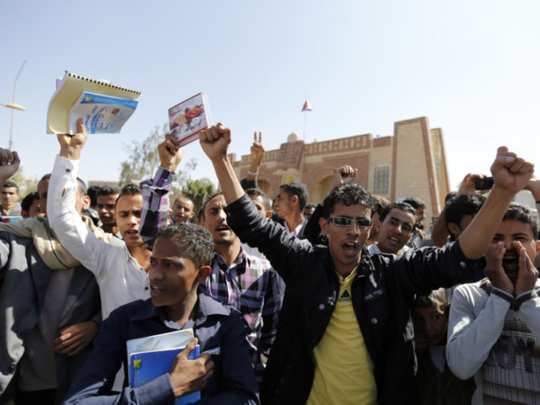
Sana’a: Two years ago, 22-year-old, dark-haired, brown-eyed Yasmin Misbahi gave up her business administration studies at Sana’a University, and turned to prostitution. With no family to seek refuge, an economy in decline, and a newborn to support, this was her only source of income.
“There are no jobs,” she said. “And with the current situation, I’m not sure,” referring to the political unrest and Al Houthi dominance in the capital.
While walking to Sana’a University, broadcasting student Mohammad Al Qalisi, pulled out his identity card with the ‘sarkha’ [Al Houthi’s slogan] in red and green embossed on the card alongside the emblem of the university.
Some say it’s wrong to blame Al Houthi rebels, but many students agree the sanctity of one of the country’s oldest institutions has been sacrificed with the armed militia on the campus.
One student pointed in the distance saying, “That’s where student protesters gather against the armed men on campus every week.”
With Yemen’s economy in persistent decline since 2011, it’s hard to imagine a future for the thousands of graduates who come out of university each year. Definite numbers of students in apprenticeships, or work, are hard to come by.
Dr Abdullah Al Mamari, visiting microbiology professor to Sana’a University said the situation looked grim.
“If 40,000 students graduate each year, a fourth of them are employed, and even that is shaky,” he said.
According to Tarek Al Sharafi, spokesperson at the Ministry of Finance, the loss hasn’t occurred all at once. “The sabotage of oil pipelines is a key reason for devastating consequences on the country’s economy since 2011,” he said.
“Due to the volatile security, the private sector has been pulling out of the country and refuses to extend opportunities.”
“The government can’t hire an extra person due to the huge deficit,” he added.
When discussing future plans, students that have the means are keen to flee Yemen for the US, Europe, or other GCC countries for better prospects.
Abdul Rahman, working at the Ministry of External Affairs, spoke of unspeakable levels of corruption at all levels. “Some people here have three or four jobs, some which they don’t attend but claim the salary.”
Until a few years ago, new graduates would join a scheme to work at the government two or three years for free, in the hope they would be absorbed full-time eventually. “But even that has changed.”
Maha Abdullah Galib, Director, Working Women’s Development, Ministry of Social Affairs and Labour, said that people above their sixties cling on to their roles. “They should leave and make way for the young people.”
With looming uncertainty, warring factions, and an economy in decline, young people are perplexed.
Walid Abdullah recently returned to Yemen from Saudi Arabia to study English and care for his ill father.
“On one side the Al Houthi slogan reads ‘Death to America’. On the other hand they are conspiring with the government and the US to get rid of AQAP [Al Qaida in the Arabian Peninsula].”
“With these lies, no education, how can we expect to see any improvement?”
The MEMRI [Middle East Media Research Institute], a US-based think-tank, in a statement on November 13, quoted a senior AQAP official stating that UN Envoy to Yemen, Jamal Bin Omar, paved the way for the Al Houthi entry into Sana’a, after he brokered a secret pact between the US and the Al Houthis that was signed by both parties.
As part of the pact, the official said that the Americans promised to aid the Al Houthis in their war against Al Qaida, both financially and militarily if they promised to defeat Al Qaida in Yemen within two years.
But spokesperson for the Al Houthi political office Al Hussain Al Bukhaiti dismissed the claims as rumours. ”No way. Al Houthis don’t talk to the American officials because they believe the US made Al Qaida through Saudi Arabia, Wahhabis and Salafists.”
“We can’t have an agreement with an entity we believe created the problem.”
Some students do not blame the Al Houthis for Yemen’s problems.
“With or without the Al Houthis, I couldn’t see a future for myself even before they took over the capital,” said M.A., who is studying at the Faculty of Languages, on condition of anonymity.
“At least the Al Houthis are fighting corruption in these government facilities,” he added.
“For this country to move forward we need to fight corruption, terrorism, and extremists,” said M.A.
Despite the challenges, Al Sharafi is hopeful. “First, we have to enforce military security and protect the pipelines in the desert,” he said.
“We have a lot of work to do, we need a national strategy for young people, and 40 per cent of my focus is on women employment. This is at inceptional stages,” Maha said.
Both Al Sharafi and Maha were reticent when asked about the militia group’s interference and admitted that the situation has been vague, but pin their hopes on a better future with the new government.
Charlene Anne is a journalist based in Sana’a












